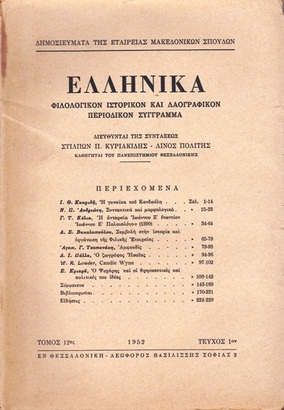Έρις περί αρετής
Part of : Ελληνικά : φιλολογικό, ιστορικό και λαογραφικό περιοδικό σύγγραμμα ; Vol.47, No.1, 1997, pages 35-52
Issue:
Pages:
35-52
Parallel Title:
Έρις περί αρετής
Author:
Abstract:
This study, based on a passage in the Constitution of the Lacedaemonians by Xenophon, attempts to assess the role and position of the hippeis in Sparta, to clarify issues concerning their selection and to point to the social and political factors involved in rivalry (ερις) as a spur to virtue within the community of the Homoioi. The rivalry which arose among Spartan citizens following their selection to the prominent body of hippeis, a rivalry recorded only by Xenophon, is evidence contrary to the belief which has prevailed to date about Spartan «concord and order». The author believes that the antagonism aroused between those excluded and those appointed, as also towards those who made the appointments, is a political form of reaction: a discord which more closely resembles the aristocratic rivalry of Homeric society than the beneficial rivalry described by Hesiod. The rivalry which arose after the appointments was contrary to both the Spartan spirit of solidarity and obedience instilled by the educational system and to the spirit of Spartan virtue, expressed through the total acceptance of the decisions made by the city authorities. The attitude of young citizens towards decisions made by the authorities, incorporating as it did a feeling of doubt, may be explained as an expression of the antagonism which existed between a group of aristocratic citizens, institutionally capable of reproducing themselves politically and thus maintaining their traditional privileges, and a democratic attitude towards political equality among citizens, as this had been recognized since the end of the seventh century BC, when aristocratic criteria for qualifications for citizenship and for participation in the exercise of authority were overturned.
Subject:
Subject (LC):
Notes:
Ευχαριστώ τη Συντακτική Επιτροπή του περιοδ. Ελληνικά για τη συμβολή τους στην αρτιότερη παρουσίαση της μελέτης αυτής και ιδιαιτέρως τον καθηγητή κ. Γ. Μ. Παράσογλου για τις χρήσιμες παρατηρήσεις του.




